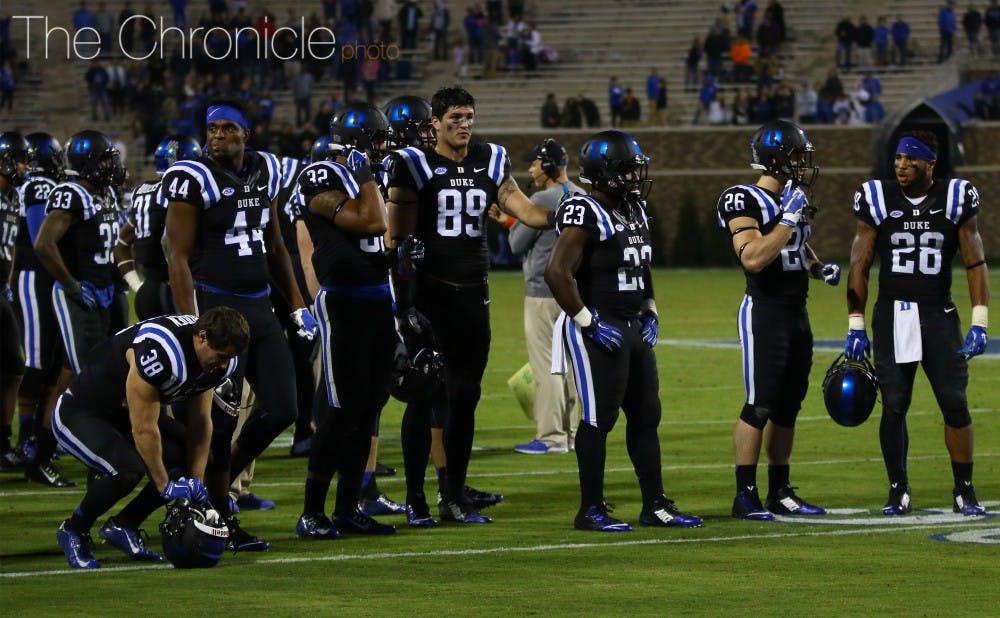Close your eyes and take a deep breath.
Now take another one. With your eyes closed, think about all the things that make you happy. Puppies, sleep, Star Wars, football, your family, etc. Let all of these wonderful objects collide within your mind. Let the feeling of petting a corgi while watching Han Solo make the Kessel Run in less than 12 parsecs wash over your being.
Did you do it? Good, good.
Do you now feel better about Saturday’s loss?
No? Hmm. Well….¯\_(ツ)_/¯
That’s more or less the answer the ACC gave this past weekend when Commissioner John Swofford released the four mistakes made by the officials, and that is the exact response the Miami football team gave Sunday on Twitter. And both, according to the rules, are right.
Let’s go ahead and establish something: No matter what happens from this point forward, Duke will have at least two losses on its official record.
You can print a schedule off and draw a million asterisks on there, but at the end of the day, when your Sharpie and inner will have shriveled, the Blue Devils will be 6-2. And the reason for that isn’t that The Man is trying to put us down because everyone hates Duke, nor is it (entirely) because of the referees. It’s because of the following rule, pulled from the NCAA’s handbook, specifically Rule 1, article 3, paragraph B:
“When the referee declares that the game is ended, the score is final.”
And that’s it. When Jerry Magallanes said, "The game is over," it not only signified the end of the game, but the ending point of the thousands of complaints and think-pieces that would ensue come Sunday and Monday. It's that statement where your argument becomes moot and begins to talk about the way something should be. But the way it is, the way the game works—as of Saturday and as of today—is that when the zebras blows the final whistle, everything is finished. That includes everything from Saturday’s game to now-distant dreams of cracking the top 15 and getting a major bowl come December and January.
First of all, this is an NCAA issue, not an ACC one. So when the conference comes out and says, "Uhhh, yeah, we messed up," that's all you're going to get from them. The league can't overturn the final result of a game, so stop blowing up Swofford's and Amy Yakola's emails. The NCAA's bylaws prevent such a decision, and for good reason.
Could you imagine how many teams and fan bases would protest games and calls if they knew you could overturn a result? It would be terrible. Now, I know the alternative isn't much better, but like Duke head coach David Cutcliffe said after the game and on Sunday, this is more of an issue about the men on the field and in the booth getting it wrong than it is one about what should be done to rectify the situation.
Now, let's talk about the real reason we're here: Saturday's loss, from a wider perspective, really doesn't matter.
Think about what you expected from the Blue Devils this year and how that controversial loss affects those expectations. I mean, Duke can still win the ACC Coastal, albeit with an extremely small margin for error, but that was the case before the game, too. The Blue Devils still have to go on the road to take on a now-ranked and fairly dangerous North Carolina squad, then turn around at home and face Pittsburgh, a team that has spent time in the top 25. Asking Duke to win both of those games is reasonable, and the difficulty was going to be high whether or not it beat Miami.
And if—and that’s a big if, mind you—the Blue Devils do win out, then Saturday’s game really won’t matter. Yes, their position in the polls has taken a hit, but if Duke goes on the road and beats the Tar Heels, then you can bet the Blue Devils will be back in the top 25. If they beat Pittsburgh, Virginia and Wake Forest and set themselves up a little date with Clemson or Florida State, then, technically speaking, Duke will still have a shot at a major bowl game. Even if the Tigers continue to draw and quarter every team like they have so far, Clemson will be off to the College Football Playoff and Duke will get an especially sexy bowl game.
And, please, for your sake, don't make the playoff argument. A two-loss team from the Coastal isn’t going to get into the playoff, but in all honesty, I wouldn’t expect a one-loss team from the Coastal to get in either. This isn't the year Duke goes to the playoff and a botched call didn't ruin it.
Instead of getting the win, the Blue Devils exposed one of college football's major flaws—its operating bylaws and adherence to a challenge system that requires referees to care more about the call on the field than getting the call right.
In that case, we all won. Except Duke, which lost.
Get The Chronicle straight to your inbox
Sign up for our weekly newsletter. Cancel at any time.

